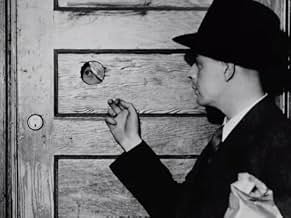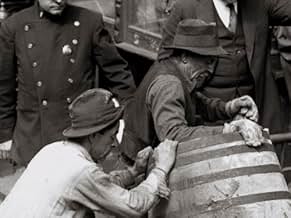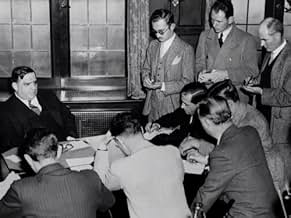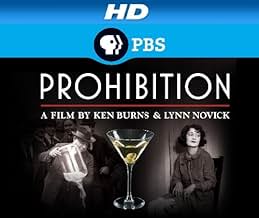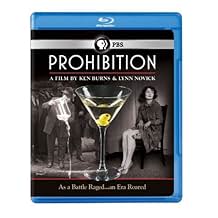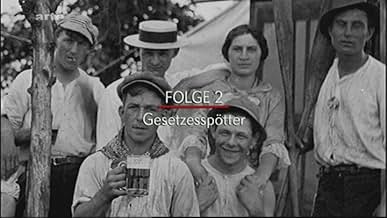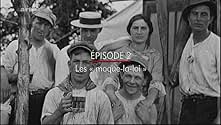NOTE IMDb
8,2/10
3,5 k
MA NOTE
Ajouter une intrigue dans votre langueThe story of the American activist struggle against the influence of alcohol, climaxing in the failed early 20th century nationwide era when it was banned.The story of the American activist struggle against the influence of alcohol, climaxing in the failed early 20th century nationwide era when it was banned.The story of the American activist struggle against the influence of alcohol, climaxing in the failed early 20th century nationwide era when it was banned.
- Récompensé par 1 Primetime Emmy
- 1 victoire et 3 nominations au total
Parcourir les épisodes
Histoire
Le saviez-vous
- AnecdotesAlthough the documentary gives the etymology of the term 'bootlegging' (people selling illegal liquor from flasks that they kept in their boot legs), the origin of the term 'speakeasy' is not further explained. According to the Etymology Dictionary, these illegal liquor saloons were called 'speakeasies' "because of the practice of speaking quietly about such a place in public, or when inside it, so as not to alert the police or neighbors".
- ConnexionsFeatured in CBS 11 News: Épisode datant du 17 août 2011 (2011)
Commentaire à la une
Daniel Okrent's "Last Call: The Rise and Fall of Prohibition" and Ken Burns and Lynn Novick's "Prohibition" mini-series were two similar projects that began together resulting in two different end products. Together, both provide a rather detailed account not only of Prohibition's place in American history, but the events leading up to such, the results of repeal and the long-lasting societal impact of the entire matter. Separate, both are still strong, informative and entertaining yet each tend to focus on different themes that sometimes do not intermingle and the result is noticeable.
Ken Burns, in his trademarked fashion, intermingles fantastically- original photos and video with colorful interviews from subject-matter experts and first-hand histories over-laced with celebrity voice-overs, makes learning hip and brings about a passion for a dark, but necessary, time in American history. Burns' documentary was too light in certain instances where a deeper look at American history would have benefited the story. Okrent's novel definitely fills in such details that Burns either ignored or edited out but was definitely too heavy at times with whole sections coming across as a historical text book rather than an entertaining narrative.
Burns, and Okrent as well, enlighten 21st-Century audiences to the fact that Prohibition, what can be now considered a silly arrangement, was not only responsible for the rise of Jazz, the introduction of mixed drinks and the invention of speed boats but also led to very beginnings of the Civil Rights Movement and the outright success of Women's Suffrage.
Naturally, Burns provides much attention to that of the gangsters of the era, particularly Chicago's Al Capone. But again, he provides just enough details for a satisfactory display of information yet fails to get deeper. Similarly, this occurs when discussing the role of the Church and the Prohibition movement. Dry Congressmen and Senators knew how to convince their Baptist and Methodist ministers to use the pulpit to condemn the evils of alcohol, particularly in the Mid-West states.
Likewise, Prohibition was an outcry not just against alcohol but also against the rise of poor immigrants filling America's urban centers. The Irish, the Germans, the Italians, all known for enjoying wine and spirits, and all Catholics, became a scary threat for "decent, Protestant country folks". Cutting off immigrants from their alcohol was a way to ensure that these new Americans were productive members of society, not a burden of filthy drunkards. Burns did not spend too much time on these ideals.
However, Burns attention to detail and crafting of a narrative tale is shown in his vision and with what is presented. He does keep entertainment at the forefront of his documentary, much like what he has done in the past, especially with his must-see Baseball series. Some indirect humor is presented with history playing the comedian to a more naïve time. Burns does get political with some of his views, but at no time are such views sobering enough to prevent the viewer from seeking out a drink.
Ken Burns, in his trademarked fashion, intermingles fantastically- original photos and video with colorful interviews from subject-matter experts and first-hand histories over-laced with celebrity voice-overs, makes learning hip and brings about a passion for a dark, but necessary, time in American history. Burns' documentary was too light in certain instances where a deeper look at American history would have benefited the story. Okrent's novel definitely fills in such details that Burns either ignored or edited out but was definitely too heavy at times with whole sections coming across as a historical text book rather than an entertaining narrative.
Burns, and Okrent as well, enlighten 21st-Century audiences to the fact that Prohibition, what can be now considered a silly arrangement, was not only responsible for the rise of Jazz, the introduction of mixed drinks and the invention of speed boats but also led to very beginnings of the Civil Rights Movement and the outright success of Women's Suffrage.
Naturally, Burns provides much attention to that of the gangsters of the era, particularly Chicago's Al Capone. But again, he provides just enough details for a satisfactory display of information yet fails to get deeper. Similarly, this occurs when discussing the role of the Church and the Prohibition movement. Dry Congressmen and Senators knew how to convince their Baptist and Methodist ministers to use the pulpit to condemn the evils of alcohol, particularly in the Mid-West states.
Likewise, Prohibition was an outcry not just against alcohol but also against the rise of poor immigrants filling America's urban centers. The Irish, the Germans, the Italians, all known for enjoying wine and spirits, and all Catholics, became a scary threat for "decent, Protestant country folks". Cutting off immigrants from their alcohol was a way to ensure that these new Americans were productive members of society, not a burden of filthy drunkards. Burns did not spend too much time on these ideals.
However, Burns attention to detail and crafting of a narrative tale is shown in his vision and with what is presented. He does keep entertainment at the forefront of his documentary, much like what he has done in the past, especially with his must-see Baseball series. Some indirect humor is presented with history playing the comedian to a more naïve time. Burns does get political with some of his views, but at no time are such views sobering enough to prevent the viewer from seeking out a drink.
Meilleurs choix
Connectez-vous pour évaluer et suivre la liste de favoris afin de recevoir des recommandations personnalisées
- How many seasons does Prohibition have?Alimenté par Alexa
Détails
- Durée1 heure
- Couleur
- Mixage
- Rapport de forme
- 16:9 HD
Contribuer à cette page
Suggérer une modification ou ajouter du contenu manquant

Lacune principale
By what name was Prohibition, une expérience américaine (2011) officially released in Canada in English?
Répondre
